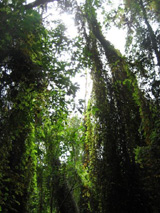NEWS
"Forest Day 3"
The Centre for International Forestry Research (CIFOR) and the other members of the Collaborative
Partnership on Forests (CPF) are inviting expressions of interest
for "Forest Day 3" on 13 December 2009, an entire day during UNFCCC COP 15
dedicated to learning about and
discussing the role of forests in climate change mitigation and
adaptation. One of the Learning Events is focusing on "Forest
Biodiversity and Climate Change". More:
http://www.cifor.cgiar.org/Events/ForestDay3/Introduction/
 Online course on REDD
Online course on REDD
The Nature Conservancy, Conservation International, the Climate,
Community, and Biodiversity Alliance, GTZ, the Rainforest Alliance,
and the World Wildlife Fund, have created a self-guided online
course on REDD. The course features 14 fun and interactive lessons
that provide a comprehensive overview of REDD. The course is free
and available to all at:
http://www.conservationtraining.org/
Forest Footprint Disclosure (FFD) Project
launched
The Global Canopy Programme
has launched the FFD project in collaboration with DFID, UNEP FI,
PRP, CDP and others. The FFD Project seeks to identify how
businesses and supply chains drive deforestation through the use of
'forest risk' commodities like beef, soy, palm oil, and timber. The
FFD Project also launched the new 'Global Forest Footprints' report.
More:
http://www.forestdisclosure.com/
REDD Methodology Modules Project
A group of forest carbon experts are completing the first modular
methodologies for REDD projects under the Voluntary Carbon Standard
(VCS). When released in late 2009, the REDD modules will enable
development of REDD projects without investing in new methodologies
on a project-by-project basis. More:
http://www.climatefocus.com/us/REDDMeth.html
Carbon offset projects within the Sierra Nevada region of California
The Sierra Business Council (SBC) is currently developing forest
carbon offset projects, located within the Sierra Nevada region of
California, using recently nationalized Climate Action Reserve
standards. The SBC has developed the first avoided conversion
project to be listed under these protocols. Projects are intended to
create a reliable funding stream dedicated to conservation and
restoration of our carbon-rich forestlands. More:
http://www.sbcouncil.org/Projects/SNCC/
|


